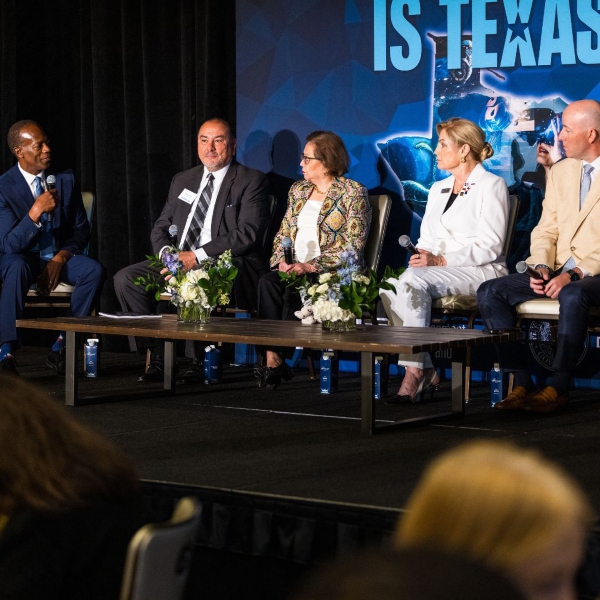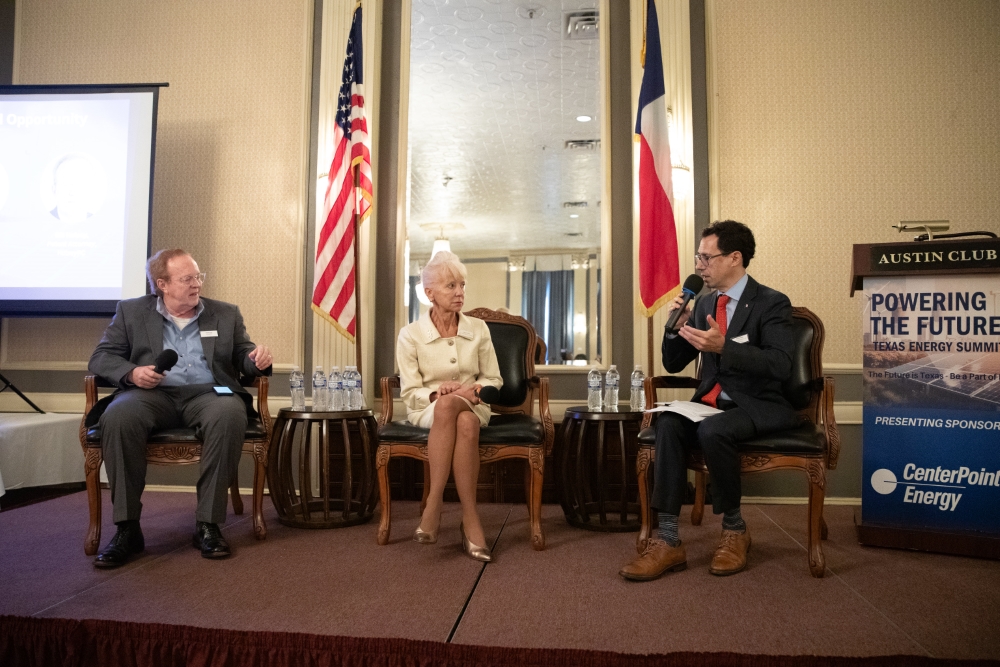TxEDC chief outlines the approach that delivers a winning strategy.
As President and CEO of the Texas Economic Development Corporation (TxEDC), Aaron Demerson leads an organization that has spent over a decade helping to position Texas as the No. 1 state for business. TxEDC is an independently funded and operated 501(c)(3) nonprofit organization responsible for marketing and promoting Texas as the premier business location. Along with the Governor’s Texas Economic Development & Tourism Office, and the TxEDC board — chaired by Arun Agarwal, CEO of Nextt — these partnerships help make up the cornerstone of Governor Greg Abbott’s economic development agenda to build a bigger, better and stronger Texas.
This strategic alignment has delivered measurable success — most notably, Texas has earned the Governor’s Cup for a record-breaking 13 consecutive years, which is awarded based on the number of qualifying capital investment projects per state. In the following interview, we asked him how Texas achieved this lofty ranking and how it plans to stay No. 1 in the years to come.
What are the factors that you think are most responsible for Texas winning the Site Selection Governor’s Cup award for a record-setting 13 years in a row?
DEMERSON: Texas consistently wins the Site Selection Governor’s Cup due to its pro-business environment, low taxes, skilled workforce, strategic location and strong infrastructure. The state offers a predictable regulatory climate, economic incentives and a high quality of life, making it attractive for business expansion and relocation. As a leading economy in the nation and around the world, Texas can provide economic incentive tools that promote job creation, energy innovation, and technological advancement — helping to attract large, capital-intensive projects that are vital for continued growth. In addition, Texas has a can-do attitude and doesn’t rest on its laurels. Even as the No. 1 state, we remain focused and driven and never take that position for granted.

“Texas consistently wins the Site Selection Governor’s Cup due to its pro-business environment, low taxes, skilled workforce, strategic location and strong infrastructure. The state offers a predictable regulatory climate, economic incentives and a high quality of life, making it attractive for business expansion and relocation.”
— Aaron Demerson, President & CEO, Texas Economic Development Corp.
In addition to having the top economic development team in the nation at the state level, we have the best of the best at the local level. This is where the rubber meets the road and our community partners are on the front lines — where deals are closed, projects take shape and the foundation for our Governor’s Cup wins is truly built. They deserve the credit for turning strategy into success.
What is your primary message when meeting with CEOs and site selectors considering a Texas business expansion opportunity?
DEMERSON: Our key message is that Texas takes a common-sense approach toward doing business. We have a business-friendly climate with no corporate income tax, a large, skilled and world-class workforce, robust infrastructure and access to global markets. The state’s economic stability and commitment to innovation make it an ideal place for business growth. Governor Greg Abbott often shares that CEOs tell him Texas provides the freedom and environment they need to succeed. When CEOs are asked why they chose Texas over other states, they often point to our business-friendly climate and the strong relationships that make them feel like friends and family. Texas is home to some of the world’s biggest and most influential brands, including impressive figures like 52 Fortune 500 corporate headquarters and over 3 million small businesses that employ the state’s world-class workforce.
Which industry sectors are growing at the fastest rate in Texas right now and why?
DEMERSON: The technology, biotech, life sciences, engineering and aerospace industries are experiencing rapid growth. Factors such as strong university partnerships, venture capital investment and a focus on innovation hubs drive this expansion. The energy transition and semiconductor manufacturing boom, fueled by state and potential federal incentives, also contribute to sector growth. To promote these sectors, we recently hosted the Powering the Future: Texas Energy Summit in Austin, sponsored by TxEDC investor CenterPoint Energy.
Panel discussions explored how Texas is managing its energy resources and implementing cutting-edge innovations that highlight the state’s leadership as a top energy producer. The event also featured remarks from TxEDC investors, and Governor Abbott’s Chief of Staff, Toby Baker — further demonstrating Texas’ “all hands on deck” approach to driving progress and collaboration across sectors.


TxEDC President & CEO Aaron Demerson moderating a panel that included former Secretary of State Hope Andrade and former board members Massey Villarreal, and Nancy Windham.
Photos courtesy of TxEDC
A good example of our progress in these advanced industry sectors came in June 2024 when Crusoe Energy Systems began construction on a 200-megawatt data center at the Lancium Clean Campus near Abilene. This initial phase includes two buildings totaling about 980,000 square feet, with operations expected to begin in the first half of 2025. In March 2025, Crusoe announced the next phase of expansion, adding six more buildings and increasing the facility’s total capacity to 1.2 gigawatts across about 4 million square feet. This development is projected to significantly boost the local economy, with the Development Corporation of Abilene estimating a direct and indirect economic impact of approximately $1 billion over 20 years. The data center aims to support advanced artificial intelligence workloads, positioning Abilene as a key player in the evolving tech landscape.
How do you plan to keep growing the space exploration industry in Texas?
DEMERSON: Texas remains committed to advancing its space industry by investing in space-related infrastructure, fostering strong public-private partnerships and supporting cutting-edge research initiatives. With industry leaders like SpaceX, Blue Origin and NASA already established in the state, Texas has a solid foundation for continued innovation.
Established in March 2024, the Texas Space Commission is a state agency dedicated to promoting innovation and leadership in space exploration and commercial aerospace opportunities within Texas. The commission administers the Space Exploration and Aeronautics Research Fund (SEARF), providing grants to businesses, nonprofits and governmental entities engaged in space exploration research or the aeronautics industry. Notably, in February 2025, the commission awarded grants totaling $47.7 million to companies such as Blue Origin, Firefly Aerospace, Intuitive Machines, SpaceX and Starlab Space, supporting various aerospace projects across the state. Governed by a nine-member board appointed by Gov. Abbott, the commission includes industry leaders like Gwen Griffin, CEO of Griffin Communications Group, serving as chair, and Kathy Lueders, general manager of Starbase at SpaceX, as vice chair. Additionally, in June 2024, Norman Roy Garza, Jr. was appointed as the commission’s first executive director, bringing extensive experience from his tenure with the Texas A&M University System.

Panelists from the “Innovation & Opportunity” discussion at the Powering the Future: Texas Energy Summit — Moderator Glenn Hamer (President, Texas Association of Business), Kelly A. Tomblin (President, El Paso Electric), and Bill Hulsey (Patent Attorney, HulseyPC) shared insights on the future of Texas energy.
Photos courtesy of TxEDC
If people are concerned about weather events and power outages in Texas and potential business interruptions, what do you tell them?
DEMERSON: Texas has made significant improvements in grid resilience and disaster preparedness. Investments in energy storage, grid modernization and diversified power generation sources, including renewables and natural gas, have strengthened reliability. Businesses can also take advantage of microgrid technology and local backup power solutions. The power grid is designed to withstand outages, but for the first time in history, the state experienced a widespread freeze that put unprecedented strain on the system. Since then, significant improvements have been made to strengthen the grid and help prevent such an event from happening again.
Texas is the No. 1 exporting state in America. How will Texas sustain that momentum as new trade tariffs come into play on all sides?
DEMERSON: Texas will continue to lead in exports by expanding global trade relationships, leveraging its vast port network and advocating for pro-growth trade policies. Ongoing investment in logistics, infrastructure and market diversification will ensure the state remains resilient in the face of global trade challenges. Sustaining this level of success requires a unique and collaborative approach — one that Texas has long embraced and will continue to champion. As a steadfast supporter of free trade, Texas remains committed to policies that drive economic opportunity at home and abroad.
“Texas has made significant improvements in grid resilience and disaster preparedness. Investments in energy storage, grid modernization and diversified power generation sources, including renewables and natural gas, have strengthened reliability.”
— Aaron Demerson, President & CEO, Texas Economic Development Corp.
Will Texas see more onshoring and reshoring projects as we move forward? What are the factors driving this?
DEMERSON: Texas is well-positioned to attract a growing wave of onshoring and reshoring projects. Key factors—such as supply chain resilience, geopolitical shifts, state and federal incentives for domestic manufacturing and a pro-business climate — make the state a top choice for companies seeking to relocate or expand operations in the U.S. Simply put, there’s no better place to do business than Texas, as Texas is the safest investment.

